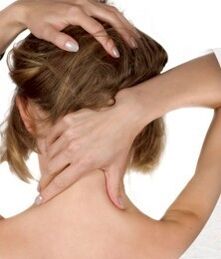Osteochondrosis is a degenerative dystrophic disease of the spine that damages the intervertebral discs, nerve roots, and soft tissue of the spine.
The clinical manifestations of cervical osteochondrosis include a variety of symptoms.The disease always becomes chronic.In osteochondrosis, cracks develop in the intervertebral discs, pathological movement (instability) of the vertebrae occurs, and disc herniation develops.In this case, not only are the nerve roots most commonly compressed, but so are the vertebral arteries that run directly into the transverse processes of the cervical vertebrae.
Symptoms of cervical osteochondrosis
The most common symptom of cervical osteochondrosis is headache.Headaches caused by cervical spondylosis may be accompanied by symptoms such as dizziness and pain in the neck area.
Causes of cervical osteochondrosis
There are various causes of changes in the cervical spine: prolonged sitting in one position in front of the computer, static load, sleeping in an uncomfortable position, hypothermia, injury.Due to this physical activity, the outflow of blood from the cervical vessels is disturbed.Tension headaches develop.Headaches may be episodic or chronic and worsened by physical activity, coughing, bending or tilting the head.Typically, headaches develop slowly, are moderate or moderate in intensity, and are characterized by persistence and monotony.Sometimes it is a migraine, which in severe cases may be accompanied by nausea and vomiting, which may be temporarily relieved later.
Typically, tension headaches have a unilateral localization, affecting the temporal and eye areas; heaviness in the eyelid area, eye pain, and decreased vision may occur.In more severe cases, dizziness may occur, including loss of consciousness.The most severe types of tension headaches are transient ischemic attacks, which can progress to ischemic stroke.
Any headache requires observation and careful examination to rule out more serious brain pathology.If you experience headaches, contact a specialist immediately - a neurologist.The clinic's specialists have extensive experience in diagnosing and treating headaches of any cause.Prompt, correct diagnosis and appropriate prescription of treatment will save you many troubles and complications.
Where to start treating osteochondrosis?
If you suspect that you or a loved one has cervical osteochondrosis, we recommend that you first consult a neurologist and have the cervical blood vessels examined.

Learn more about related diseases and symptoms:
- Panic attacks and depression in osteochondrosis
If a person does not have a natural tendency to depression, then there are no significant events in life that "bring him out of trouble", in 90% of cases we are talking about problems with the physical state of important systems (cardiovascular and circulatory systems).The cause of osteochondrosis, which causes uncontrollable panic and a reluctance to enjoy life, is a form of degeneration of the vertebral cartilage that leads to disruption of the function of the surrounding nerve roots and blood vessels.
- Depression in osteochondrosis: treatment.
The main reason for increased anxiety, apathy, and depression in patients with osteochondrosis is a lack of oxygen to the brain.The bone tissue in the neck can become deformed due to long periods of sitting, stressful work, inactivity, and lack of regular physical activity.
- About the causes of depression
Although doctors warn people that they cannot tolerate the pain, not everyone heeds this advice.Regular pain, combined with stress, physical inactivity, and bad habits, can lead to a depressive state.This is the first stage of depression.
- Depression in osteochondrosis: causes and prerequisites
Neurologists' experience shows that physical and psychological illnesses are often related.The body cannot keep running "like a clock," especially if it is not "wound up" regularly.An active lifestyle, physical exercise, proper nutrition, positive emotions – people deprive themselves of these pleasures in the pursuit of material well-being.Result: cartilage degeneration, circulatory impairment and related consequences: dizziness, insufficient response to psycho-emotional stimulation, increased anxiety and sometimes panic attacks.
- Spinal hernia.Everything you need to know.
Based on their many years of experience, the clinic's top experts have gathered for you all the necessary information about the prevention, treatment and prevention of herniated discs.



















